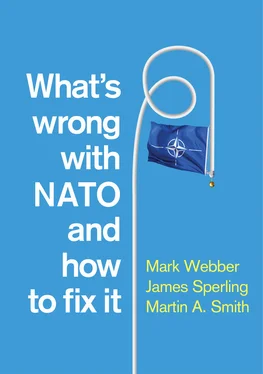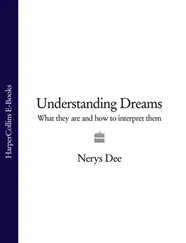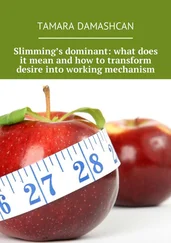23 23. On this sort of problem see Michael D. Cohen, James G. March and Johan P. Olsen, ‘A Garbage Can Model of Organizational Choice’, Administrative Science Quarterly, 17(1), 1972, pp. 1–25.
24 24. A phrase borrowed from Asle Toje, ‘The First Casualty in the War against Terror: The Fall of NATO and Europe’s Reluctant Coming of Age’, European Security, 12(2), 2003, p. 64.
25 25. Cited in Eckhard Lübkemeier, ‘NATO’s Identity Crisis’, Bulletin of the Atomic Scientists, 46(8), 1990, pp. 30–3.
26 26. Cited in Kristina Spohr, Post Wall, Post Square: How Bush, Gorbachev, Kohl, and Deng Shaped the World after 1989 (New Haven and London: Yale University Press, 2019), p. 286.
27 27. Adrian G.V. Hyde-Price, European Security beyond the Cold War: Four Scenarios for the Year 2010 (London etc.: The Royal Institute of International Affairs and SAGE Publications, 1991), p. 201.
28 28. Cited in Jennifer Medcalf, Going Global or Going Nowhere? NATO’s Role in Contemporary International Security (Oxford etc.: Peter Lang, 2008), p. 67.
29 29. Zbigniew Brzezinski, ‘NATO – Expand or Die?’, New York Times, 28 December 1994, https://www.nytimes.com/1994/12/28/opinion/nato-expand-or-die.html.
30 30. Robert E. Hunter, ‘Maximizing NATO: A Relevant Alliance Knows How to Reach’, Foreign Affairs, 78(3), 1999, pp. 190–1.
31 31. Lord George Robertson, ‘Reflections on 9/11’, NATO YouTube channel, 7 September 2011, https://www.youtube.com/watch?v=EkaBVwnod7g.
32 32. Andrew Cottey, ‘NATO: Globalization or Redundancy?’, Contemporary Security Policy, 25(3), 2004, p. 394.
33 33. ‘Forward’, Prague Summit 2002: Selected Speeches and Documents (Brussels: NATO Public Diplomacy Division, 2003), p. 4.
34 34. Anne Deighton, ‘The Eleventh of September and Beyond: NATO’, Political Quarterly, 73(1), 2002, pp. 131–2.
35 35. Commenting in February 2008 and cited in Mark Webber, Ellen Hallams and Martin A. Smith, ‘Repairing NATO’s Motors’, International Affairs, 90(4), 2014, p. 981.
36 36. House of Commons Defence Committee, Towards the Next Defence and Security Review: Part Two – NATO (third report of session, 2014–15), para. 65, https://publications.parliament.uk/pa/cm201415/cmselect/cmdfence/358/35802.htm.
37 37. Cited in James Sperling and Mark Webber, ‘NATO and the Ukraine Crisis: Collective Securitization’, European Journal of International Security, 2(1), 2017, p. 41.
38 38. Ian Hope, ‘Introduction. Projecting Stability: Elixir or Snake Oil?’, in Ian Hope (ed.), Projecting Stability: Elixir or Snake Oil? (Rome: NATO Defence College, 2019), pp. 1–5.
39 39. ‘Brussels Summit Declaration’, 11 July 2018, para. 29, https://www.nato.int/cps/en/natohq/official_texts_156624.htm.
40 40. Stephen Sestanovich, Maximalist: America in the World from Truman to Obama (New York: Alfred A. Knopf, 2010), pp. 259–72.
41 41. Sestanovich, Maximalist, p. 261. (Sestanovich was an ambassador-at-large in the Clinton administration.)
42 42. George W. Bush, Decision Points (London and New York: Virgin Books, 2010), pp. 396–7.
43 43. Derek Chollet, The Long Game: How Obama Defied Washington and Redefined America’s Role in the World (New York: Public Affairs, 2016), pp. 203–31.
44 44. Cited in Andreas Krieg, ‘Externalizing the Burden of War: The Obama Doctrine and US Foreign Policy in the Middle East’, International Affairs, 92(1), 2016, p. 104.
45 45. Elbridge A. Colby and A. Wess Mitchell, ‘The Age of Great-Power Competition: How the Trump Administration Refashioned American Strategy’, Foreign Affairs, 99(1), 2020, https://www.foreignaffairs.com/articles/2019-12-10/age-great-power-competition.
46 46. Caitlin Oprysko, ‘“NATO Plus ME”: Trump Proposes NATO Expansion into Middle East’, Politico, 9 January 2020, https://www.politico.com/news/2020/01/09/trump-nato-expansion-proposal-096772.
47 47. Judith Goldstein and Robert O. Keohane, ‘Ideas and Foreign Policy: An Analytical Framework’, in Judith Goldstein and Robert O. Keohane (eds), Ideas and Foreign Policy: Beliefs, Institutions and Political Change (Ithaca, NY, and London: Cornell University Press, 1993), pp. 3–30.
48 48. NATO ‘Rome Declaration on Peace and Cooperation’, November 1991, paras 1 and 2, https://www.nato.int/docu/comm/49-95/c911108a.htm.
49 49. See the Clinton administration sources cited in Frank Schimmelfennig, ‘NATO Enlargement: A Constructivist Explanation’, Security Studies, 8(2–3), 1998, pp. 198–234.
50 50. Fatjona Mejdini, ‘Albanian PM Talks Balkans and Security with Obama’, Balkan Insight, 15 April 2016, https://balkaninsight.com/2016/04/15/albanian-primer-meets-obama-to-talk-balkans-and-security-04-15-2016/.
51 51. Press Statement of US Secretary of State Michael R. Pompeo, 23 October 2019, https://www.state.gov/welcoming-u-s-senate-approval-of-nato-accession-protocol-for-north-macedonia/.
52 52. Speech before the Chicago Economic Club, 22 April 1999, https://www.globalpolicy.org/component/content/article/154/26026.html.
53 53. Hélène Mulholland, ‘Libya: Military Action Necessary, Legal and Right, Says David Cameron’, The Guardian, 21 March 2011, https://www.theguardian.com/politics/2011/mar/21/libya-military-action-necessary-david-cameron; Paul Harris, ‘Barack Obama Defends US Military Intervention in Libya’, The Guardian, 29 March 2011, https://www.theguardian.com/world/2011/mar/29/barack-obama-us-speech-libya.
54 54. NATO, ‘Chicago Summit Declaration on Afghanistan’, 21 May 2012, para. 2, https://www.nato.int/cps/en/natolive/official_texts_87595.htm
55 55. Sten Rynning, NATO in Afghanistan: The Liberal Disconnect (Stanford: Stanford University Press, 2012), p. 3.
56 56. Patrick Porter, ‘Why Britain Doesn’t Do Grand Strategy’, RUSI Journal, 155(4), 2010, pp. 8–9.
57 57. NATO, ‘London Declaration’, para.1.
58 58. Dominic Tierney, ‘The Ethics of Unwinnable Wars’, in Andrew R. Hom, Cian O’Driscoll and Kurt Mills (eds), Moral Victories: The Ethics of Winning Wars (Oxford etc.: Oxford University Press, 2017), p. 127.
59 59. ‘Afghanistan; Worth the Cost’, speech by NATO Secretary General Anders Fogh Rasmussen to the NATO Parliamentary Assembly, 17 May 2013, https://www.nato.int/cps/en/natolive/opinions_100598.htm?selectedLocale=en.
60 60. Peter Beaumont, ‘Afghanistan Papers Reveal US Public Was Misled about Unwinnable War’, The Guardian, 9 December 2019, https://www.theguardian.com/world/2019/dec/09/afghan-papers-reveal-us-public-were-misled-about-unwinnable-war.
61 61. Joseph Votel, ‘Ending America’s Endless War in Afghanistan’, New York Times, 11 December 2019, https://www.nytimes.com/2019/12/11/opinion/war-afghanistan-talks.html; Anthony H. Cordesman, ‘Afghanistan: A War in Crisis’ (Washington, DC: Centre for Strategic and International Studies, September 2019), p. 2, https://www.csis.org/analysis/afghanistan-war-crisis.
62 62. ‘Afghanistan: Background and US Policy in Brief’, Congressional Research Service, 5 December 2019, pp. ii, 6, https://fas.org/sgp/crs/row/R45122.pdf.
63 63. Max Fisher, ‘In Afghanistan’s Unwinnable War, What’s the Best Loss to Hope For?’, New York Times, 1 February 2018, https://www.nytimes.com/2018/02/01/world/asia/afghanistan-war.html.
64 64. George Packer, Our Man: Richard Holbrooke and the End of the American Century (London: Jonathan Cape, 2019), pp. 488–540.
65 65. George Kennan, ‘A Fateful Error’, New York Times, 5 February 1997, https://www.nytimes.com/1997/02/05/opinion/a-fateful-error.html?searchResultPosition=1.
66 66. John J. Mearsheimer, The Great Delusion: Liberal Dreams and International Realities (New Haven and London: Yale University Press, 2018), p. 176.
67 67. First Deputy Foreign Minister Igor Frolov cited in Jeremy Black, ‘Russia and NATO Expansion Eastward: Red-lining the Baltic States’, International Journal, 54(2), 1999, p. 257.
Читать дальше












